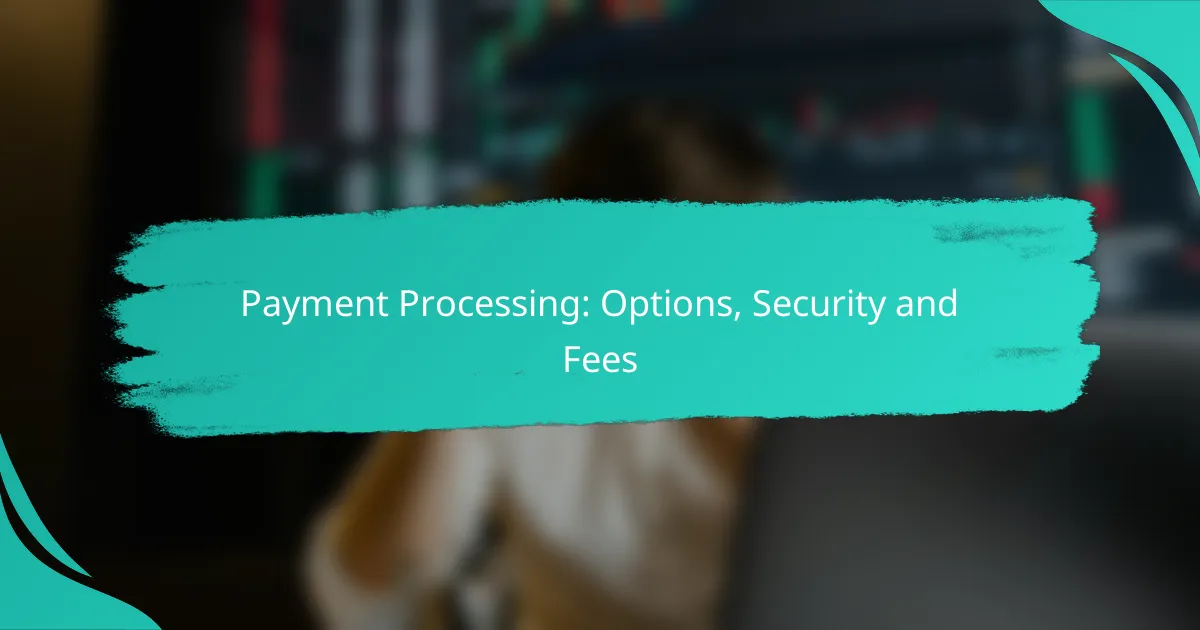In today’s digital economy, choosing the right payment processing option is essential for businesses to thrive. With various services like PayPal, Square, and Stripe available, each offers distinct features, fees, and security measures tailored to different needs. Understanding the associated fees and implementing robust security protocols are crucial for protecting sensitive financial data and optimizing profit margins.
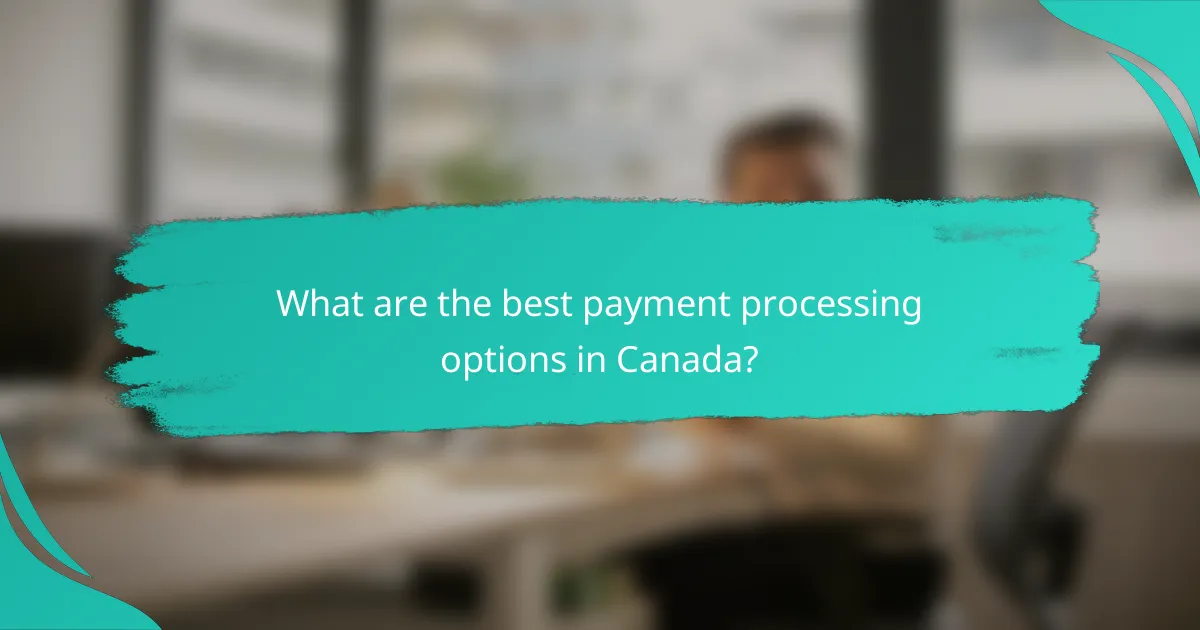
What are the best payment processing options in Canada?
The best payment processing options in Canada include PayPal, Square, Stripe, Authorize.Net, and Moneris. Each of these services offers unique features, fees, and security measures that cater to different business needs.
PayPal
PayPal is a widely recognized payment processing platform that allows businesses to accept payments online easily. It offers features like invoicing, subscription billing, and integration with various e-commerce platforms.
Fees typically range from 2.9% + CAD 0.30 per transaction, which can vary based on sales volume. PayPal also provides buyer and seller protection, enhancing security for both parties.
Square
Square is known for its user-friendly interface and comprehensive point-of-sale (POS) solutions. It allows businesses to accept payments in-person and online, making it versatile for various retail environments.
Square charges a flat rate of around 2.65% per transaction for in-person payments and 3.4% + CAD 0.15 for online transactions. Its free POS software and hardware options make it an attractive choice for small businesses.
Stripe
Stripe is a robust payment processing solution designed for online businesses and developers. It offers extensive customization options and supports a wide range of payment methods, including credit cards and digital wallets.
Stripe’s fees are generally around 2.9% + CAD 0.30 per transaction. It also provides advanced security features, such as fraud detection and PCI compliance, which are crucial for online transactions.
Authorize.Net
Authorize.Net is a long-established payment gateway that caters to businesses of all sizes. It offers features like recurring billing, customer profiles, and advanced fraud detection tools.
Fees for Authorize.Net typically include a monthly gateway fee and transaction fees around 2.9% + CAD 0.30. This option is ideal for businesses looking for a reliable and secure payment processing solution.
Moneris
Moneris is one of Canada’s largest payment processors, providing services for both in-person and online transactions. It offers various solutions tailored to different industries, including retail and e-commerce.
Moneris’s pricing structure can vary based on the services used, but it generally includes transaction fees that can range from 1.5% to 3.5%. Its strong focus on security and compliance makes it a trusted choice for Canadian businesses.
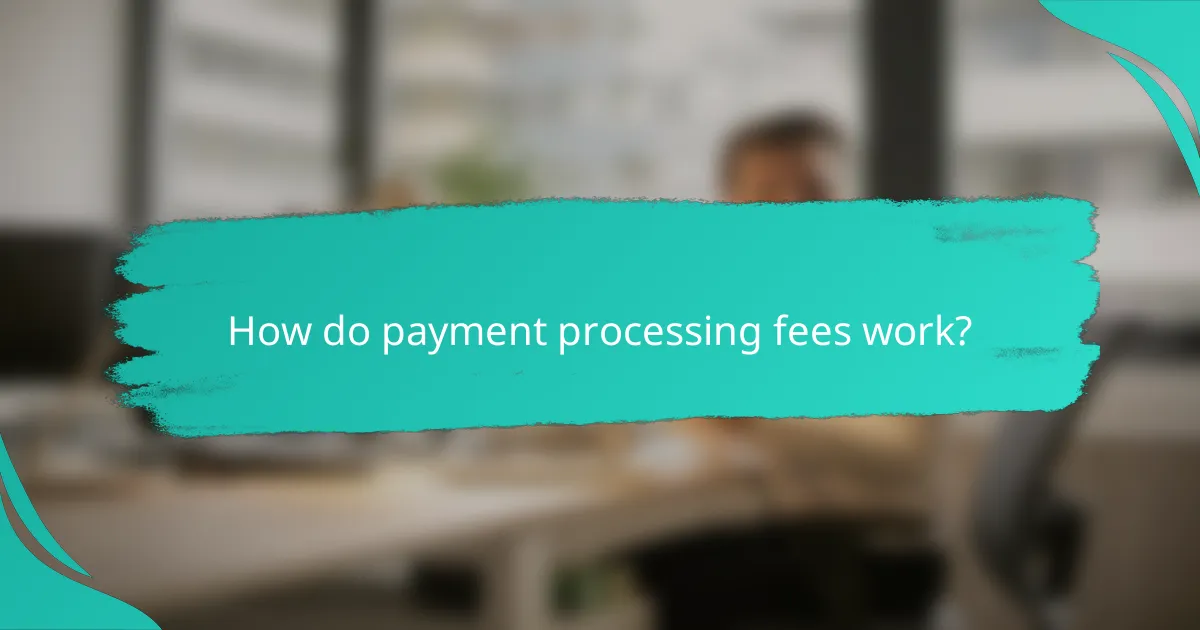
How do payment processing fees work?
Payment processing fees are charges incurred when businesses accept electronic payments, typically calculated as a percentage of the transaction amount plus a fixed fee. Understanding these fees is crucial for managing costs and maximizing profit margins.
Transaction fees
Transaction fees are the primary costs associated with payment processing, usually expressed as a percentage of the sale plus a fixed amount per transaction. For example, a common structure might be 2.9% plus $0.30 per transaction. These fees can vary based on the payment method, such as credit cards, debit cards, or digital wallets.
When selecting a payment processor, compare transaction fees across different providers. Some may offer lower rates for high-volume businesses, while others might have flat rates that are easier to predict for smaller operations.
Monthly fees
Monthly fees are recurring charges that payment processors may impose for account maintenance or access to certain features. These fees can range from a few dollars to several hundred, depending on the services provided, such as advanced reporting tools or fraud protection.
It’s important to assess whether the features included justify the monthly fee. For instance, if a processor offers valuable analytics that can enhance your sales strategy, the fee may be worth it. Always read the fine print to avoid unexpected charges.
Chargeback fees
Chargeback fees are incurred when a customer disputes a transaction, leading to a reversal of the payment. These fees can range from $15 to $100 or more, depending on the processor and the nature of the dispute. Chargebacks can significantly impact a business’s bottom line, both through direct fees and potential loss of merchandise.
To minimize chargebacks, maintain clear communication with customers and ensure accurate product descriptions. Implementing robust fraud detection measures can also help reduce the likelihood of disputes, ultimately saving on associated costs.
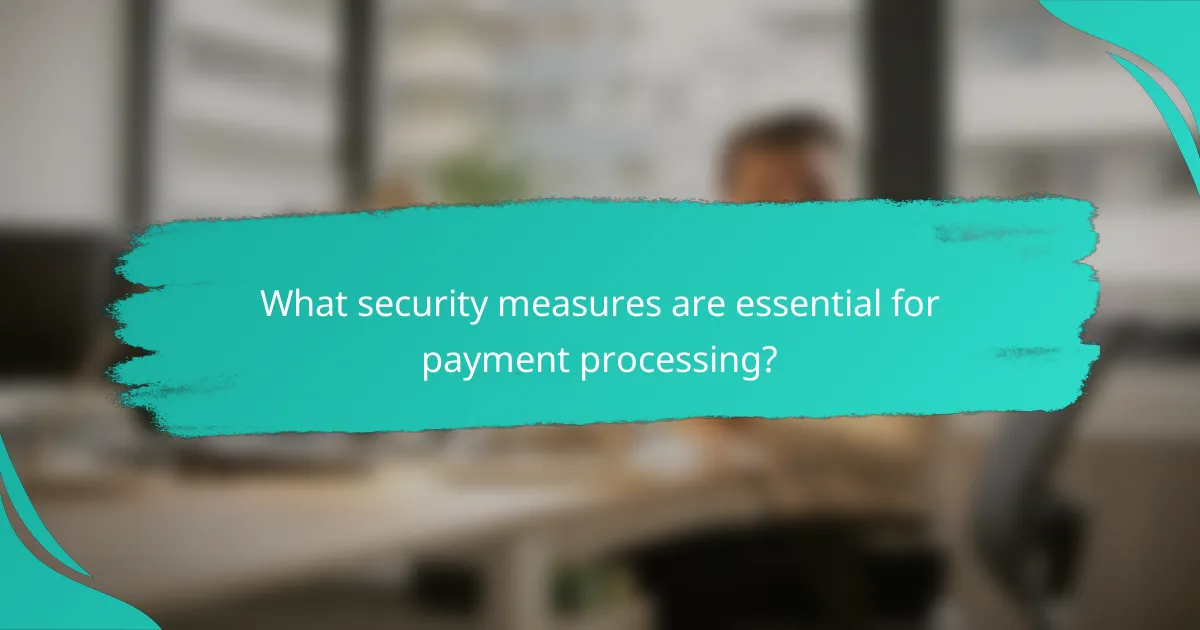
What security measures are essential for payment processing?
Essential security measures for payment processing include compliance with industry standards, robust encryption, and effective fraud detection tools. These elements work together to protect sensitive financial data and ensure secure transactions.
PCI compliance
PCI compliance refers to adherence to the Payment Card Industry Data Security Standard (PCI DSS), which sets requirements for organizations that handle credit card information. Compliance helps protect cardholder data and reduces the risk of data breaches.
To achieve PCI compliance, businesses must implement specific security measures, such as maintaining a secure network, encrypting data transmissions, and regularly monitoring access to cardholder data. Non-compliance can lead to significant fines and increased liability.
Encryption protocols
Encryption protocols are crucial for securing payment data during transmission. They convert sensitive information into a coded format that can only be decoded by authorized parties, preventing unauthorized access.
Common encryption methods include SSL (Secure Sockets Layer) and TLS (Transport Layer Security), which are widely used to secure online transactions. Businesses should ensure that their payment processing systems utilize up-to-date encryption protocols to safeguard customer data.
Fraud detection tools
Fraud detection tools help identify and prevent fraudulent transactions in real-time. These tools analyze transaction patterns and behaviors to flag suspicious activities, allowing businesses to take action before losses occur.
Effective fraud detection may involve machine learning algorithms, transaction monitoring systems, and user verification processes. Implementing these tools can significantly reduce the risk of chargebacks and financial losses associated with fraud.
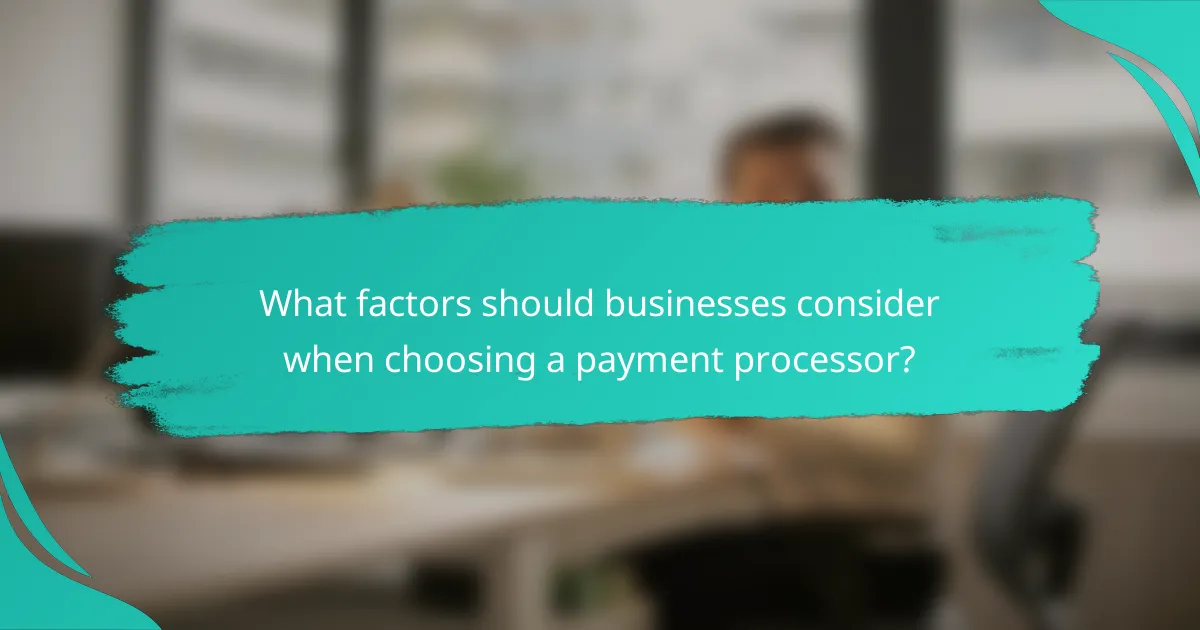
What factors should businesses consider when choosing a payment processor?
Businesses should evaluate several key factors when selecting a payment processor, including fees, integration capabilities, and customer support. These elements can significantly impact transaction efficiency, costs, and overall customer satisfaction.
Fee structure
The fee structure of a payment processor can vary widely, typically including transaction fees, monthly fees, and chargeback fees. Businesses should look for a transparent pricing model that aligns with their transaction volume and average sale size. For example, a processor with a flat rate might be beneficial for those with low sales volume, while tiered pricing could suit high-volume merchants.
Common fees include a percentage of each transaction (often ranging from 1.5% to 3.5%) and a fixed fee per transaction (usually between $0.10 and $0.30). Understanding these costs helps businesses estimate their monthly expenses and choose a processor that minimizes fees.
Integration capabilities
Integration capabilities refer to how easily a payment processor can be incorporated into existing systems, such as e-commerce platforms or point-of-sale systems. A processor that offers seamless integration can save time and reduce technical issues. Businesses should check for compatibility with their current software and whether the processor provides APIs or plugins for easy setup.
Additionally, consider whether the processor supports multiple payment methods, such as credit cards, digital wallets, and bank transfers. This flexibility can enhance customer experience and potentially increase sales.
Customer support
Reliable customer support is crucial for resolving issues quickly and minimizing downtime. Businesses should assess the availability of support channels, such as phone, email, and live chat, as well as the hours of operation. A processor offering 24/7 support can be particularly valuable for businesses operating in multiple time zones.
It’s also beneficial to review customer feedback regarding support responsiveness and effectiveness. A processor with a reputation for excellent customer service can help businesses navigate challenges more efficiently and maintain smooth operations.
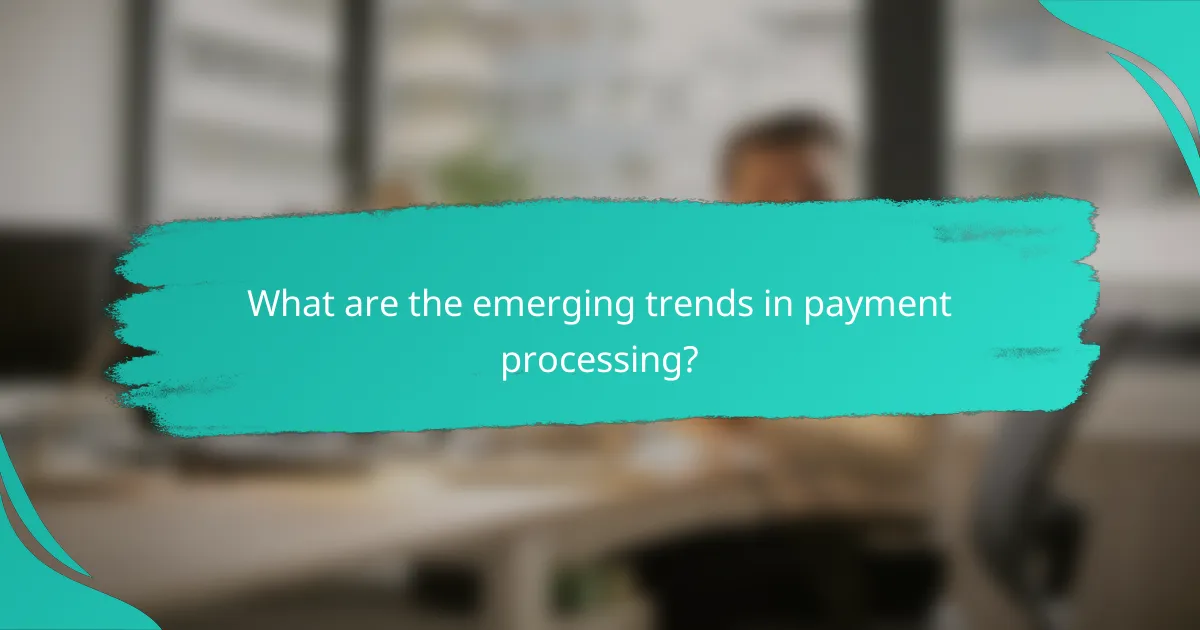
What are the emerging trends in payment processing?
Emerging trends in payment processing include the rise of mobile payment solutions and the growing acceptance of cryptocurrencies. These trends reflect a shift towards more convenient, secure, and innovative methods of conducting transactions.
Mobile payment solutions
Mobile payment solutions allow consumers to make transactions using their smartphones or other mobile devices. Popular options include digital wallets like Apple Pay, Google Pay, and Samsung Pay, which enable users to link their bank accounts or credit cards for quick payments.
Businesses should consider integrating mobile payment options to enhance customer convenience and streamline checkout processes. Offering mobile payments can lead to increased sales, especially among younger consumers who prefer using their devices for transactions.
Cryptocurrency acceptance
Cryptocurrency acceptance is becoming more prevalent as businesses recognize the potential benefits of digital currencies like Bitcoin and Ethereum. Accepting cryptocurrencies can attract tech-savvy customers and reduce transaction fees associated with traditional payment methods.
However, businesses must be aware of the volatility of cryptocurrencies and the regulatory landscape surrounding them. Implementing a reliable payment processor that supports cryptocurrency transactions is essential for managing risks and ensuring compliance with local regulations.
